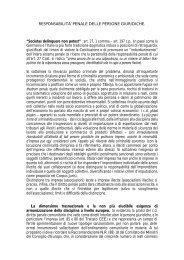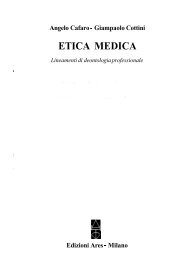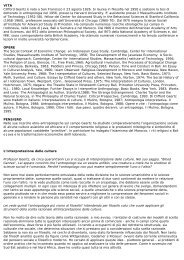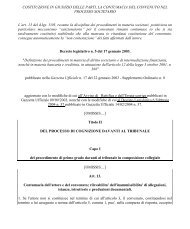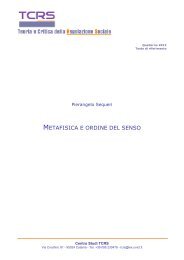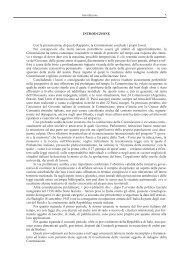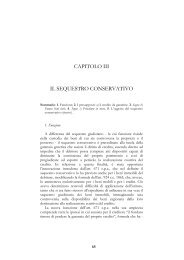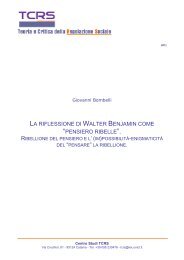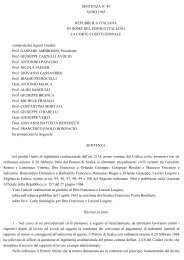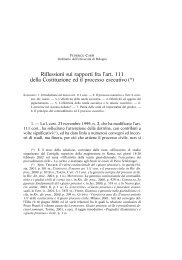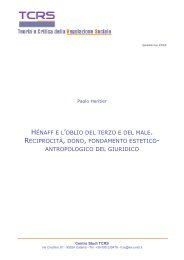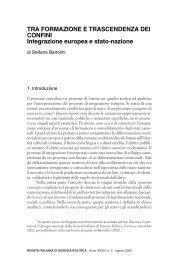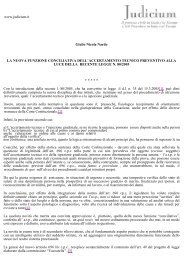FOGLI DI LAVORO per il Diritto internazionale 3 ... - Giurisprudenza
FOGLI DI LAVORO per il Diritto internazionale 3 ... - Giurisprudenza
FOGLI DI LAVORO per il Diritto internazionale 3 ... - Giurisprudenza
Create successful ePaper yourself
Turn your PDF publications into a flip-book with our unique Google optimized e-Paper software.
180<br />
<strong>FOGLI</strong> <strong>DI</strong> <strong>LAVORO</strong> <strong>per</strong> <strong>il</strong> <strong>Diritto</strong> <strong>internazionale</strong> 3/2008<br />
14. The Administrative Court found that those terms evoked<br />
a negative connotation of the basic contents of the applicant<br />
associations' religious beliefs and that the use of those terms<br />
infringed their religious freedom guaranteed by Article 4 § 1 of<br />
the Basic Law. It considered, however, that the use of the term<br />
“sect” as such had no negative impact on the applicant<br />
associations' religious belief.<br />
15. The Administrative Court pointed out that there was no<br />
indication that the applicant associations pursued exclusively<br />
commercial aims or that the teachings of Osho or the methods<br />
employed by the applicant associations were contrary to human<br />
dignity. The right protected by Article 4 of the Basic Law<br />
obliged the State to maintain strict neutrality regarding religious<br />
activities and prohibited negative judgments on a determined<br />
religious belief. Furthermore the use of such general terms was<br />
not appropriate for the prevention of danger.<br />
16. On 28 Apr<strong>il</strong> 1986 the Government appealed against that<br />
judgment. A hearing was held before the Administrative Court<br />
of Appeal of the Land North Rhine-Westphalia<br />
(Oberverwaltungsgericht für das Land Nordrhein-Westfalen) on<br />
22 May 1990. By a judgment of the same day the<br />
Administrative Court of Appeal quashed the impugned<br />
judgment and dismissed the applicant associations' claim as a<br />
whole, as well as the appeals of two applicant associations who<br />
had contested the findings of the first-instance court as regards<br />
the use of the term “sect”. It did not allow an appeal on points of<br />
law.<br />
17. The Administrative Court of Appeal found that the<br />
contested statements interfered with the applicant associations'<br />
basic rights guaranteed by Article 4 §§ 1 and 2 of the Basic<br />
Law. However, the right to religious freedom was not absolute.<br />
It was subject to limitations by other provisions of the Basic<br />
Law. Limitations and interferences by the State had to be<br />
accepted where important reasons of public interest required the<br />
protection of basic rights which were in conflict with the right to<br />
freedom of religion. Where a mere suspicion of a possible<br />
violation of these rights existed, relevant information and<br />
warnings were appropriate and necessary for their protection.<br />
Under Article 65 of the Basic Law, which vested governmental<br />
functions in the Government, taken together with the positive



